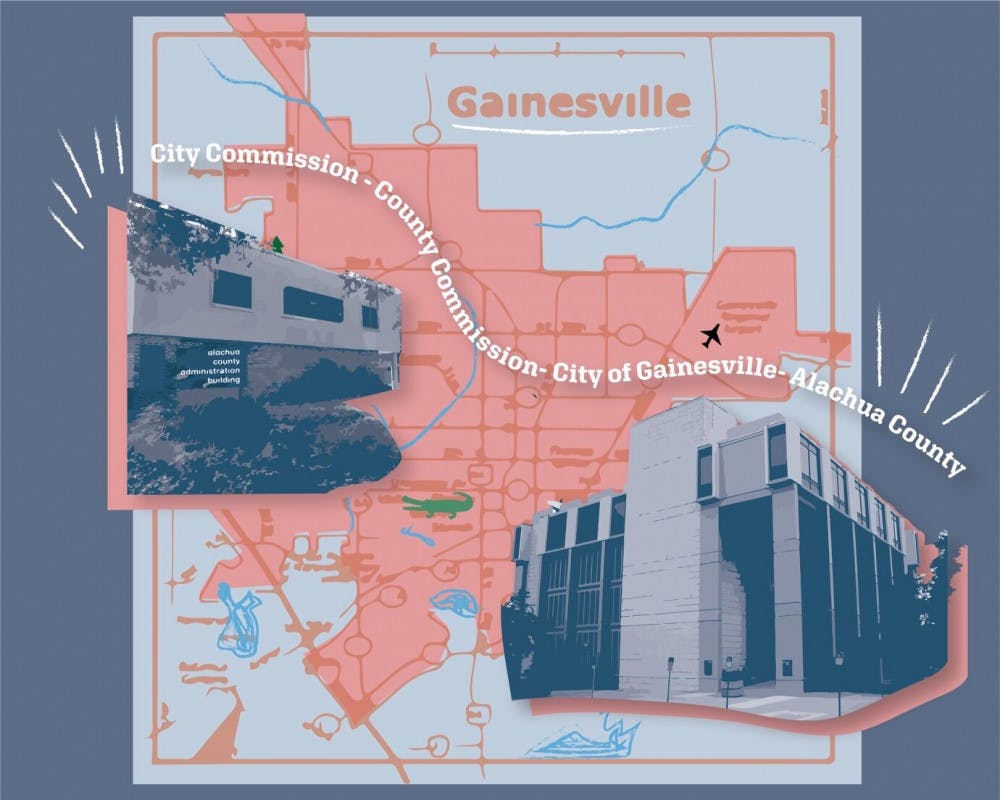At its Thursday meeting, the Gainesville City Commission received updates on the progress of two state bills that could affect Gainesville’s police oversight and tax cuts given to luxury student housing.
The commission discussed House Bill 601, which could disband Gainesville’s police advisory council, as well as Senate Bill 328, which acts as an amendment to the Live Local Act. The commission hopes changes could patch a loophole that allows luxury student housing developments to claim tax exemptions intended for affordable housing.
House Bill 601
HB 601 was introduced in November by Rep. Wyman Duggan, R-Jacksonville, who claimed civilians serving on Civilian Oversight Agencies lacked qualifications to intervene in misconduct investigations of law enforcement and correctional officers. The bill moves to disband these COAs and instead allow departments or state authorities to handle any misconduct investigations internally.
Gainesville is listed as one of 21 Florida cities with an active COA, called the Police Advisory Council in the city’s charter, according to a 2022 Leroy Collins Institute study. The study also shows cities with COAs have seen a 15% reduction in total Black arrest rates, as well as fewer Black arrests per 100,000 compared to cities not adopting a COA.
Commissioner Casey Willits disputes the idea that Gainesville’s PAC lacks qualifications and said the commission has always aimed for broad community representation within the council.
“There’s very few qualifications to be on the State House of Representatives or the State Senate,” Willits said. “So that argument is a little thin to me.”
He moved to send a resolution opposing the bill to state officials. However, this resolution didn’t pass, with the commission voting 5-2 with Commissioners Willits and Bryan Eastman in favor. Although the other commissioners voiced their opposition to the bill, they questioned whether its Police Advisory Council would be affected in the first place.
Their doubt stems from the bill's wording, which stated COAs would be prohibited from conducting “the receipt, processing, or investigation of complaints of misconduct by law enforcement officers and correctional officers.”
“That’s just not what our Police Advisory Council does,” City Attorney Daniel Nee said. “The closest they would come to it is reviewing closed investigations.”
The commission said it would continue to monitor the bill’s progress, and ask the Florida League of Cities, a lobbying agency of more than 400 Floridian cities and municipalities, to elevate its lobbying efforts to oppose the bill.
Live Local Act amendments
A recent report by the Florida Housing Finance Corporation shows seven Gainesville apartments are applying for tax breaks under the Live Local Act, a 2023 bill aimed at promoting affordable housing development. This makes Alachua County the third largest applicant for these tax breaks in Florida.
However, of these seven apartments, six refer to themselves as “student apartments” and claim full-time students as low-income residents to cash millions in tax breaks intended to fund affordable housing. These properties, Alsander GNV, Aero on 24th, Anthem House, Campus Circle, Residences at Markets West, Theory Gainesville and RISE Thirty Fourth, totaled over $4.7 million in paid taxes in 2023, which would be cut by 75% without an amendment to the bill.
Most affordable housing bills make exemptions for full-time students, as they rely on parental support and loans for housing, neither of which is reported as income. However, the Live Local Act does not have such an exemption, allowing apartments to claim students as “low-income” residents.
"The impact of this could be millions of dollars a year in lost revenue for our community which was meant for affordable housing, not to subsidize expensive student apartments,” said Eastman.
Rent for a one-bedroom over the seven apartments ranges between $1,550 and $1,710, well over Gainesville’s average price of $1,179, according to Rent.com. However, they remain under the bill’s rent cap of $1,951, meaning they can claim the benefits of affordability despite charging over market rates.
City leaders are asking the state legislature to close this loophole by way of SB 328, which aims to amend shortcomings of the Live Local Act.
"I like the Live Local Act, but luxury student developers are taking advantage," Eastman said. “We’ll continue to lobby and try to get them to close this loophole, so the act will work for what it was intended for, to create affordable homes for working families.”
The City Commission will meet again Feb. 15.
Contact Henry DeAngelis at hdeangelis@alligator.org. Follow him on X @hadeangelis.
Henry DeAngelis is a third-year journalism major and the City and County Commission reporter for the Alligator. In his free time, you can find him on the basketball court or deep in a good book.






